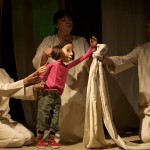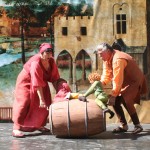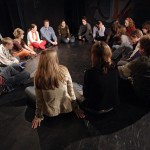
The educating rol of culture: the city of Budapest
Budapest is the capital of Hungary, a Central European country that was devastated by the two world wars and following that underwent repeated changes of its political system. After the restoration of democracy in the country, the marks left by many of those conflicts still remain but have never been brought out in the open and examined.
This situation triggered the idea of using theatre as a powerful instrument of expression, learning and social cohesion. It wasn’t just seen as an outlet through which young people could express their concerns and wishes, but also as an ideal means of encouraging intergenerational dialogue.
KOLIBRI THEATRE
The Kolibri Child and Youth Theatre was created as a space in which to rehearse and carry out theatrical projects targeted both to children and young people and to the adults in their lives. Therefore, the actual performances have been, right from the start, as important as the conversations that followed.
The aim is to provide resources allowing adults and youngsters, with different life experiences, to find common ground by sharing artistic experiences that address collective problems. It is about transforming the audience’s individual reactions into a shared experience. To accomplish this, it is vitally important that the theatrical programming be genuine.
The effect of this project transcends the actual theatre walls and reaches all public spaces, including educational institutions. Thus, any space can be a potential theatrical venue.
The Kolibri Theatre programming includes 28 performances covering a range of subjects from interactive musical pieces to puppet shows or short readings. There is additional didactic material provided with each performance.
The City of Budapest’s Departments of Education and Culture recognize the important role theatre plays in young peoples’ social integration. As a result, theatrical training has expanded into all areas. In addition to the Kolibri Theatre, the City Council supports thirteen other theatres.
The presence of theatre in public spaces, festivals, celebrations, etc., extends beyond the actual city limits. The fact that theatrical events can be programmed both in large open spaces and in small classrooms alike, is proof of the City of Budapest’s commitment to educating.
Charter of Educating Cities: Fourth Principle.
The municipal policies of an educational character shall always be understood as referring to a broader context inspired by the principles of social justice, democratic community spirit, quality of life and the edification of the individual citizen.




